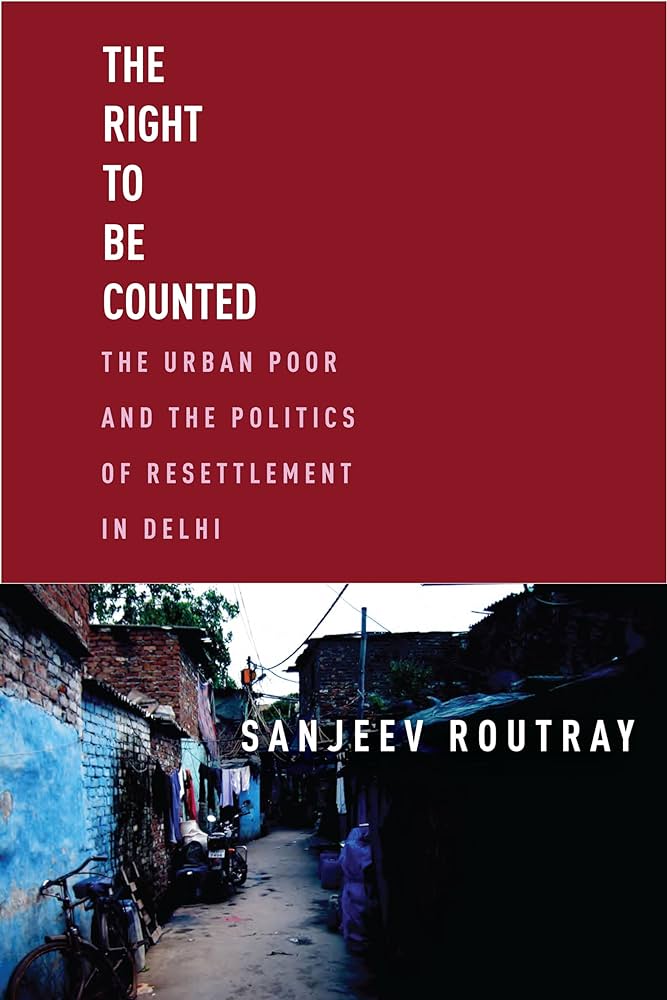
Sanjeev Routray’s book The Right To Be Counted: The Urban Poor and the Politics of Resettlement in Delhi published by Stanford University Press in 2022 documents the citizenship projects of the poor in Delhi against the backdrop of urban restructuring and planning in the city which excludes them. The book consists of thick descriptions from the field and some amount of participatory observations making it an engaging read. Through twenty-five months of ethnography conducted in three sites – a jhuggi jhopri settlement, a transit camp, and a new re-settlement colony – which are all state-recognized settlements, Routray puts forward his arguments on ‘numerical citizenship’. However, the search for numerical citizenship as discussed here is not homogenous or consistent; on the contrary, it is uneven and layered, despite being persistent.
The book includes six core chapters which are divided into two parts – politics of planning and politics of the poor; apart from the introduction and conclusion which meticulously connect these parts. In the first part of the book, we find that the discussions are historically contingent, where the author not only explains how urban planning facilitated the upper ranks of the society creating designated spaces of leisure and consumption but also how the overall planning of demolition and restructuring aims to achieve a ‘world-class’ city excluded the poor. Here we find that the role, techniques, and tactics of intermediaries namely pradhans (chiefs), samaj sevaks (social workers), and sarkari karmacharis (government workers) are significant. The second part of the book focuses completely on how numerical citizenship is claimed and performed through documents and enumerative counter-tactics. In this context, the author brings in narratives related to the court cases that were filed and the legal outcomes that were achieved, which in turn accentuates the community solidarity and resistance against the state diktats.
Early in the book, Routray points out that rann-nitis (tactics and counter-tactics) of the poor in obtaining a range of social rights and entitlements in the city are indispensable to their journey of claims-making, and thereby builds upon this idea throughout his work. This book ‘describes this process of claims-making as the struggle for “numerical citizenship,” or the struggle to be “counted” for a political community of the poor to assert its numerical strength’ (p. 2). Hence, Routray deploys a detailed analysis of the political agency of the poor themselves and their consciousness to establish this point. He highlights the importance of documents, claims for authenticity, everyday struggles to contest “temporary” status, and even resorting to counterfeiting. He notes that most people in these neighbourhoods possess documents related to the settlements, therefore it can be said that they are aware of the political landscape of the city. They are also aware of the politicized local democratic practices. Unlike Bayat’s (2010) assertions for ‘politics of presence’, Routray stretches his arguments further by highlighting claims-making as a struggle and efforts of the poor in auto-archiving. Apart from this major contribution, he also observes that the poor engage in performative resistance demonstrations of various forms to gain recognition and become ‘visible’. Here the importance of kinship networks and the transformation of social relationships (which extends beyond differences of caste, religion, and regional origin) are also taken into consideration as the author describes the plights of the migrant poor and their social sufferings.
This book adds to the array of literature available on Delhi but particularly contributes to the political dynamics of the city. Routray’s work asserts that focusing on numerical citizenship in the city can be unique and further explores how documents can be considered sites of ethnographic research. Therefore, given the protests and discussions on the Citizenship Amendment Act (CAA) since 2019, the author himself mentions that ‘this book contributes to a timely analysis of how the state enumerates, documents, or counts its citizens’ (p. 23). With the struggles of the urban poor to make themselves visible, and the social structures and institutions trying to suppress them, this book becomes a commendable piece of ethnographic research juxtaposing both their journeys. I would claim that while Uma Kalpagam’s (2014) work brilliantly examined different techniques of enumeration under colonial governmentality, Routray repositions the strategies of enumeration in contemporary times albeit from below. This book would be of interest to scholars in the disciplines of sociology, anthropology, history, and urban planning amongst others.
***
Sreya Sen is an Assistant Professor of Sociology at the School of Social Sciences and Languages, Vellore Institute of Technology (VIT), Vellore.
[…] post The Right To Be Counted: The Urban Poor and the Politics of Resettlement in Delhi by Sanjeev Routray… appeared first on Doing […]